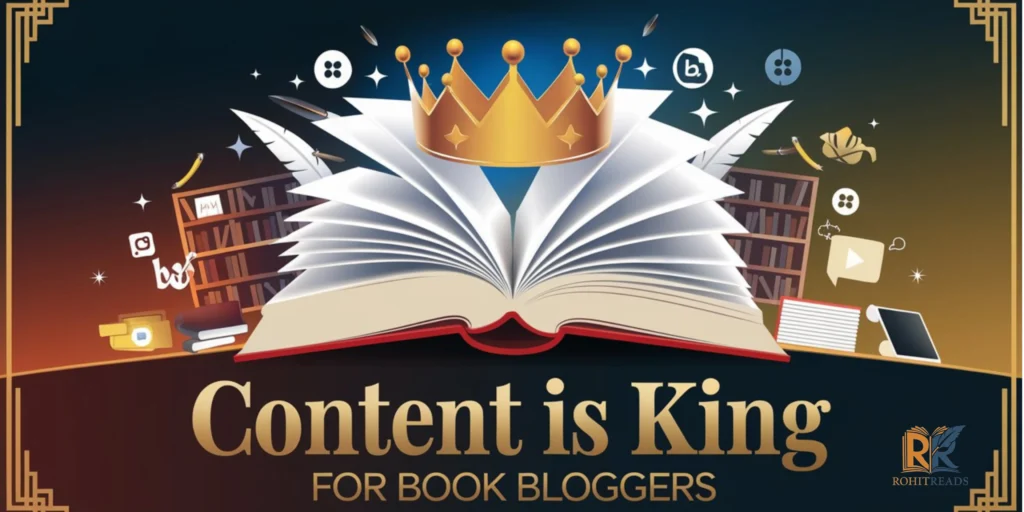
Why Quality Content Matters for Book Bloggers?
In the world of blogging be it any type of blogging, there’s a phrase that is always used: “Content is King.” This saying has never been more relevant than today, especially for book bloggers and that too in the time of Artificial Intelligence(AI). In an age where readers can access thousands of blogs and reviews with a single click, how can we make sure our content stands out? The answer is simple—by focusing on the quality of our content. As a book blogger, we are not just writing for ourself but for an audience that values insightful, engaging, and well-researched articles. In this blog, we’ll dive deep into why quality content is the backbone of successful book blogging and how it helps us connect with our audience, grow our platform, and improve our SEO rankings in the Search Engine Result Page(SERP).

What Does “Content is King” Mean for Book Bloggers?
At its core, the phrase “Content is King” highlights the importance of high-quality, relevant, and valuable content in attracting and retaining an audience. For book bloggers, this means that our reviews, recommendations, and personal reflections on literature needs to offer something unique and meaningful. In simple language, the content we create should provide value to our readers.
In the competitive world of book blogging, it’s not enough to just write a few paragraphs about a book’s plot and characters . Readers come to book blogs looking for fresh perspectives, thoughtful critiques, and insightful analysis. Whether we are reviewing the latest bestseller or an under rated indie book, our audience wants to know why they should care about the book and how it might impact their lives. This is where quality content comes in. By providing in-depth reviews, well-structured recommendations, and engaging discussions, we will build trust with our readers and keep them coming back for more.

How High-Quality Content Boosts our SEO Rankings
As a budding and aspiring digital marketer I have learned in the course of time that SEO (Search Engine Optimization) is a crucial aspect of running a successful book blog. By creating content that is both reader-friendly and search engine-friendly, we increase our chances of ranking higher on Google and other search engines. But how does high-quality content contribute to better SEO?
Search engines, like Google, prioritize content that is informative, well-written, and engaging. When readers spend time on our blog, interact with our content (by leaving comments, sharing posts, or clicking internal links), and return to our site regularly, it signals to search engines that our blog provides value. In turn, Google rewards us with better rankings. Whereas a poorly written, keyword-stuffed content will drive readers away, increasing our bounce rate and negatively impacting our rankings.

What does this mean for book bloggers?
To improve our SEO, the most important thing to do is to focus on producing high-quality content that readers actually want to engage with. Incorporating relevant keywords naturally into our blog posts, such as “best book blogs,” “in-depth book reviews,” or “top self development books of all time.” Etc. However, it is important to avoid stuffing our content with too many keywords, as this can lead to penalties from search engines. Instead, as a blogger its important to focus on writing quality content that answers the questions our readers are asking and provides genuine value.

Creating Content that Resonates with the readers
One of the biggest challenges for book bloggers is creating content that resonates with the audience. With so many book blogs out there, it’s important to understand who our readers are and what they are looking for. Do they prefer long-form reviews with in-depth analysis, or do they enjoy quick book recommendations they can easily browse through? Are they interested in specific genres like self-help, fantasy, or historical fiction? Knowing our audience is key to understanding and producing content that will keep them engaged and coming back for more.
Tips for creating reader-focused content
Knowing our Niche: Book bloggers often focus on specific genres or types of books. By specializing in a niche, whether it’s self-development, fantasy, or non-fiction, we can attract readers who are specifically interested in that area. This helps create a loyal and content hungry audience.
Writing In-Depth Reviews: Instead of just summarizing a book, its important to dive deeper into the themes, characters, and writing style. Offering our personal insights and reflections on how the book resonated with us. Readers appreciate genuine opinions and thoughtful analysis.
Encourage Engagement: Asking our readers questions at the end of our blog posts. For example, if we are reviewing a novel then asking our audience what they thought of the main character or if they agree with our interpretation of the ending. This encourages comments and discussions, helping us to build a thoughtful and interactive community.
Staying Consistent: Consistency is key when building a successful blog. Whether we post once a week or once a month, sticking to a regular schedule is the most important part of any blogging so that readers know when to expect new content.
The Role of Social Media in Amplifying our Content
In the digital age, having a book blog is just the beginning. Social media platforms, especially Instagram (or Bookstagram), Facebook, Pinterest, Twitter or LinkedIn play a significant role in promoting our content and engaging with our readers. Social media is not just a place where we can come and distribute our blogs; it’s a space where we can connect with fellow book lovers, authors, and other bloggers. But how does social media help amplify our content and build our blog’s reach?

Instagram (Bookstagram): One of the most popular platforms for book bloggers, Instagram allows us to share visually appealing content related to books, including book covers, reading lists, and mini-reviews. We can also use Instagram stories to share quick thoughts on what we are currently reading or showcasing in our latest blog post.
Facebook: another wonderful medium to create pages and to appeal to a mass via a community is through Facebook. Here we can use it as a medium same as an instagram account where we can share and update videos, images, articles and much more. We can also backlink our posts to our website to create more traffic and vice versa.
Pinterest: Creating eye-catching pins that link back to our blog. Pinterest is especially useful for sharing book lists, reading challenges, or other listing related posts. Its always important to use keywords in our posts to appeal more towards being search-friendly.
Twitter: Using Twitter to share blog updates, participate in book-related discussions, and connect with authors. Tweeting about trending topics or books can help drive more traffic to our blog and especially with proper hashtags it can reach a wide audience where we can easily connect with people of our niche and establish a wonderful audience base.
LinkedIn: Another very famous social media is linkedin where we can professionally connect with the people of our niche to expand our reach and connect with like-minded professionals. By sharing thoughtful reviews, engaging content, and personal insights, we can establish ourselves as an industry expert. LinkedIn’s professional audience offers opportunities to collaborate with publishers, authors, and literary influencers. The platform’s features, such as articles, polls, and groups, allow for diverse content strategies, fostering deeper engagement.

Social media also boosts our Seach Engine optimisation (SEO) making it more user-friendly, search engine-friendly and website-friendly. When people share our content on platforms like Facebook, Twitter, or Pinterest, it increases our blog’s visibility, and Google takes this social signal into account when ranking our website.
Diversifying our Content: What to do other than just Book reviews?
While book reviews are at the heart of most book blogs, diversifying our content can help attract a wider audience and keep our blog fresh. Always Consider adding different types of posts to the blog like the ones given below:
Author Interviews: Interviewing authors and sharing their insights on writing, book themes, or upcoming releases are what most established bloggers do as it adds much weight to the blog post and can attract readers interested in learning more about the writing process and how an author actually comes up with the idea of writing the book and what was the inspiration behind the same.
Reading Lists: Creating curated reading lists based on specific themes, genres, or moods are what readers look for. As book bloggers it’s really important to thoroughly know about the niche that we are posting for, there should be a few genres where we have a complete idea about. For example, “Best Self-Development Books for Personal Growth” or “Must-Read Historical Novels of 2024.”
Discussion Posts: Writing opinion pieces on trending topics in the book world, such as the impact of audiobooks, the rise of indie authors or SEO in the age of AI etc. Encouraging our readers to share their thoughts in the comments and actively participating in the in-flow and out-flow of conversation is one of the most essential things to do for any blogger.
Guest Posts: Collaborating with other book bloggers or writers to create guest posts will itself add to the weightage of the website. This helps to diversify our content and introduces our blog to a whole new audience and helps us grow.
By offering a variety of content, we will keep our readers engaged and attract new visitors who may not be looking for traditional book reviews but for other useful insights.
Why Quality Content Will Always Be King?
In the ever-evolving landscape of digital marketing and book blogging that too in the age of AI, one thing remains constant: content is king. By focusing on creating high-quality, valuable content that resonates with our audience, we will not only build a loyal readership but also improve our SEO rankings. Whether we are writing in-depth book reviews, sharing reading lists, or engaging with our audience on social media, the key to success is providing genuine, engaging, and well-structured content.

As a book blogger, our passion for literature can shine through in our writing, but it’s the quality of our content that will truly set us apart. Remember, it’s not just about ranking on Google—it’s about building a community of readers who trust our recommendations and love to engage with our insights. Content will always be king in the world of book blogging, and by focusing on quality, we will reign supreme for sure. By focusing on delivering insightful and engaging content, we will not only grow our book blog but also foster meaningful connections with our audience. Let our passion for books and our commitment bring change in the society on the whole.


Hi there I am so thrilled I found your website, I really found you by mistake, while I was browsing
on Yahoo for someething else, Anyhow I am here now and would jusat like to say many thanks
forr a fantastic posst and a all round entertaining blog (I
also love thee theme/design), I don’t have time tto go thhrough it all at
the moment but I have saved it and also included your RSS feeds, so when I have time I will be back to read more, Please do keewp up the fantastic jo. https://evolution.Org.ua/
Thank you so much for your kind words! 😊 I’am thrilled to hear that you enjoyed the blog and design. It’s always exciting to connect with readers like you, even if by chance! 🎉
I appreciate you saving the page and subscribing to the RSS feed—it means a lot to us. Take your time to explore, and whenever you’re back, I’d love to hear more of your thoughts. Don’t hesitate to reach out if you have any questions or suggestions.
Looking forward to having you visit again! 💻✨